Carla Guerrón Montero
Carla Guerrón Montero is an applied cultural anthropologist with studies in the United States and Latin America, specializing in the anthropology of tourism, the anthropology of food, the African diaspora, applied/engaged anthropology, and world anthropologies. Professor Guerrón Montero is Professor of Anthropology at the University of Delaware, with joint appointments in Latin American and Iberian Studies, Africana Studies, and Women and Gender Studies. She received a PhD degree in Cultural Anthropology and Latin American Studies from the University of Oregon; a Master of Arts degree in Applied Anthropology from Oregon State University (United States), and a Licenciatura degree in Socio-cultural Anthropology from the Pontificia Universidad Católica del Ecuador (Quito-Ecuador). Professor Guerrón Montero studies the complex and multiple meanings and representations of identities among marginalized populations in modern Latin American and Caribbean nation-states (Brazil, Ecuador, Grenada, and Panama). Her book, From Temporary Migrants to Permanent Attractions: Tourism, Cultural Heritage, and Afro-Antillean Identities in Panama (University of Alabama Press, 2020), offers a new reading of Panama’s nation-building process, using the transnational phenomenon of tourism as a lens to interpret it. Based on long-term ethnographic and archival research, this historical ethnography studies the intersection of tourism, multiculturalism, and nation-building. In 2023, she published the Spanish translation of this work, Población Afroantillana y Turismo en Panamá: De Migrantes Temporales a Atractivos Permanentes (Editorial FLACSO). In addition to authoring several book chapters, she has published in English, Portuguese, and Spanish in professional journals such as Anthropological Quarterly, Bulletin for Latin American Research, Ethnology, Human Organization, the Journal of Tourism and Cultural Change, and Ecology of Food and Nutrition. She recently served as Associate Editor of the Journal of Latin American and Caribbean Anthropology (JLACA). Professor Guerrón Montero has also contributed to the applied, public, engaged, and world anthropology literature. She is the editor of Careers in Twenty-First Century Applied Anthropology: Perspectives from Academics and Practicing Anthropologists (Wiley, 2008) and co-editor of Why the World Needs Anthropologists (Routledge, 2021). This volume received the 2021 Slovenian Research Agency Excellence in Science Award. Routledge will publish a second edition of the book (Podjed and Guerrón Montero) in September 2025. Her research has been funded by the National Endowment for the Humanities (NEH), the Fulbright, the Ford Foundation, the Inter-American Foundation, the Nippon Foundation (Japan), the National Science Foundation (NSF), and the National Secretary for Higher Education, Science, and Technology (SENESCYT, Ecuador). In 2025, Professor Guerrón Montero was the Robert C. Harman Distinguished Scholar in Applied Anthropology at California State University, Long Beach. She has been Fellow at the Schomburg Center for Research in Black Culture (New York) and Senior Researcher and Lecturer at the Facultad Latinoamericana de Ciencias Sociales (Quito, Ecuador). Additionally, Professor Guerrón Montero has been Visiting Scholar at the Centre for Latin American Research and Documentation’s (CEDLA) in Amsterdam (Netherlands); the Catalan Institute for Research on Cultural Patrimony (ICRPC) in Girona (Spain); the Museu Nacional of the Universidade Federal de Rio de Janeiro (UFRJ) in Rio de Janeiro (Brazil); the University of Ljubljana and Research Centre of the Slovenian Academy of Sciences and Arts (ZRC SAZU) in Ljubljana (Slovenia), and the Institut des Hautes Etudes de L’Amérique Latine IHEAL, Université Sorbonne Nouvelle 3 (France). |
Mónica Domínguez Torres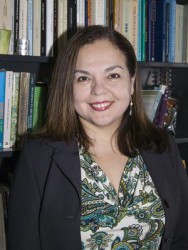
Mónica Domínguez Torres specializes in the arts of the early modern Iberian World, with particular interest in cross-cultural exchanges between Spain and the Americas during the period 1500-1700. She received a B.A. in Art History from the Universidad Central de Venezuela, a Masters in Museum Studies and a Ph.D. in the History of Art from the University of Toronto, Canada. Since 2005, she holds a joint appointment in Latin American and Iberian Studies. She currently serves as Associate Director of UD’s Center for Material Culture Studies. She is the author of Pearls for the Crown: Art, Nature, and Race in the Age of Spanish Expansion (Penn State University Press, 2024), which analyzes a selection of objects and images connected to the Atlantic pearl industry in order to reveal the messages they articulate about imperial expansion, providential wealth, racial hierarchies, and human mastery over nature. This project was supported by grants and fellowships from the Getty Research Institute, the Bard Graduate Center, the Renaissance Society of America, and the National Endowment for the Humanities, among others. She has published various essays based on this research, including “Pearl Fishing in the Caribbean: Early Images of Slavery and Forced Migration in the Americas” in African Diaspora in the Cultures of Latin America, the Caribbean and the United States, edited by Persephone Braham (University of Delaware Press, 2015); “Nel piu ricco paese del Mondo: Cubagua Island as an Epicenter of the Early Atlantic Trade” in Circulación: Movement of Ideas, Art and People in Spanish America, edited by Jorge Rivas (Denver: Frederick & Jan Mayer Center, Denver Art Museum, 2018); “Mastery, Artifice, and the Natural Order: A Jewel from the Early Modern Pearl Industry” in The Oxford Handbook of History and Material Cultures Studies, edited by Ivan Gaskell and Sarah A. Carter (New York: Oxford University Press, 2020); and “Pearls for the King: Philip II and the New World Pearl Industry” in Picture Ecology: Art and Ecocriticism in Planetary Perspective, edited by Karl Kusserow (Princeton: Princeton University Art Museum, 2021). Previously she published Military Ethos and Visual Culture in Post-Conquest Mexico (Ashgate, 2013), a study of the martial imagery fostered within the indigenous settlements of central Mexico, and the ways in which local communities appropriated, manipulated, modified, and reinterpreted foreign visual codes related to military worth. In 2008-09, she was awarded a Kluge fellowship at the Library of Congress to work on the project “Blazons of the Anáhuac: The Production, Regulation and Consumption of Indigenous Heraldry in Sixteenth-Century Mexico,” whose results have been featured in two important books: “Emblazoning Identity: Indigenous Heraldry in Colonial Mexico and Peru” appeared in the book Contested Visions in the Spanish Colonial World (Yale University Press, 2011), which was awarded the 2012 Eleanor Tufts Book Prize from the American Society for Hispanic Art Historical Studies; and “Los escudos de armas indígenas y el lenguaje heráldico castellano a comienzos del siglo XVI” was published in Los escudos de armas indígenas: de la colonia al México independiente, edited by María Castañeda de la Paz and Hans Roskamp (Colegio de Michoacán, Instituto de Investigaciones Antropológicas, UNAM, 2013). With Professor Wendy Bellion, she co-edited Objects in Motion: Art and Material Culture across Colonial North America (2011), a special issue of the journal Winterthur Portfolio featuring papers presented at an international symposium they organized at the University of Delaware in 2008. This collaboration has also extended to the classroom, offering graduate seminars on “Colonial Art Across North America” and co-authoring the essay “Teaching Across the Borders of North American Art History,” which appeared in A Companion to American Art, edited by John Davis, Jennifer Greenhill, and Jason LaFountain (Wiley-Blackwell, 2015). Professor Domínguez Torres has also published articles in the Bulletin of Latin American Research, Archivo Español de Arte, American Art,Anales del Instituto de Investigaciones Estéticas, and Delaware Review of Latin American Studies. |
Zara Anishanslin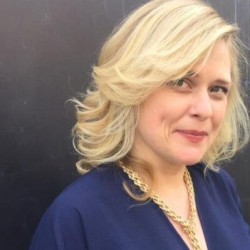
Zara Anishanslin specializes in Early American and Atlantic World History, with a focus on eighteenth-century material culture. Anishanslin received her PhD in the History of American Civilization at the University of Delaware in 2009, where her dissertation won the prize for Best Dissertation in the Humanities. In 2011, it also won the University of Pennsylvania’s Zuckerman National Prize in American Studies. In 2014-15, Anishanslin was a Mellon Postdoctoral Fellow at the New York Historical Society. In 2009-2010, Anishanslin was the Patrick Henry Postdoctoral Fellow in the Department of History at Johns Hopkins University. Additional fellowships include grants from the Omohundro Institute of Early American History and Culture, The Huntington Library, the American Antiquarian Society, Center for the Humanities at the CUNY Graduate Center, The Library Company, Harvard Atlantic Seminar, the Massachusetts Historical Society, the McNeil Center for Early American Studies at the University of Pennsylvania, Henry Luce Foundation/American Council of Learned Societies, and the Winterthur Museum. She has co-chaired the Columbia Seminar on Early American History and Culture and can regularly be found talking history on the Travel Channel show, “Mysteries at the Museum.” Her first book, Portrait of a Woman in Silk: Hidden Histories of the British Atlantic World, was released by Yale University Press in 2016. Her new research focuses on material culture and the American Revolution. |
Wendy Bellion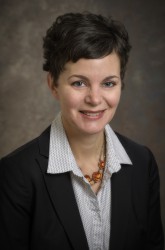
Professor Wendy Bellion (Ph.D. Northwestern University) teaches American art history and material culture studies. Professor Bellion’s scholarship takes an interdisciplinary approach to American visual and material culture, focusing on the late colonial and early national United States and exploring American art within the cultural geographies of the British Atlantic world and early modern Americas. Her book Citizen Spectator: Art, Illusion, and Visual Perception in Early National America (2011), which was awarded the 2014 Charles C. Eldredge Prize for Outstanding Scholarship by the Smithsonian American Art Museum, examines the exhibition of illusionistic paintings and optical devices within post-revolutionary cultures of sensory discernment and undeceiving. She is also co-editor (with Prof. Mónica Domínguez Torres) of Objects in Motion: Art and Material Culture across Colonial North America (2011), a special issue of the journal Winterthur Portfolio. A forthcoming book, Iconoclasm in New York: Revolution to Reenactment (fall 2019), explores a history of material violence in Revolutionary New York, tracing acts of political iconoclasm and the return of destroyed things in visual representations and civic performances. Her publications include essays on trompe l’oeil representation, sculpture, drawing instruments, theatrical illusion, and art-historical methodologies. Professor Bellion taught at Rutgers University and the College of William and Mary before joining the University of Delaware in 2004. As the Terra Foundation for American Art/Institut National d’Histoire de l’Art Visiting Professor in 2015, she taught at the Université de Paris 7 (Paris Diderot) and the École Normale Supérieure. An elected member of the American Antiquarian Society, she been awarded grants and fellowships from the American Antiquarian Society, Center for Advanced Study in the Visual Arts (National Gallery of Art), Henry Luce Foundation, Library Company of Philadelphia, National Endowment for the Humanities, Omohundro Institute of Early American History and Culture, and Winterthur Museum. She has contributed to exhibitions at the National Gallery of Art, the Art Institute of Chicago, the Newberry Library, and the National Museum of Women in the Arts. She serves on the Executive Board for the Historians of Eighteenth-Century Art and Architecture (HECAA) and on editorial boards for Bloomsbury, the University of Delaware Press, and the journal Winterthur Portfolio. Professor Bellion advises graduate students in American art history and serves on the Executive Committee of the Winterthur Program in American Material Culture. Her undergraduate courses include surveys of American art history and seminars on topics including fakes and forgeries, illusionism, and the Peale family in Philadelphia. Her graduate seminars include courses on methods and historiography, iconoclasm, sculpture, and the transcultural arts of the colonial Americas. |
Geoff Bil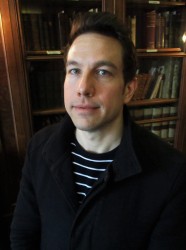
Geoff Bil is a historian of science and European empires, with specialization in nineteenth- and twentieth-century botany, anthropology, empire, Indigenous and environmental history. Prior to joining the University of Delaware, he was a 2018–2019 Andrew W. Mellon Postdoctoral Fellow at the New York Botanical Garden, and held predoctoral fellowships at the Newberry Library, University of Sussex, and Victoria University of Wellington. He received his PhD in History from the University of British Columbia (2018). His first book manuscript, “Indexing the Indigenous: Plants, Peoples and Empire” (under contract with Johns Hopkins University Press) examines the history of British imperial engagements with Indigenous and vernacular knowledges in Aotearoa New Zealand and elsewhere. Dr. Bil’s second book-length project, “Fields of Empire: Science, Ethnoscience and the Making of the American Century,” tracks American imperial engagements with Indigenous and vernacular knowledges in Sumatra and the Philippines under the emerging rubrics of ethnobotany and ethnoecology. His work has appeared in History of Science, British Journal for the History of Science, History of Pharmacy and Pharmaceuticals, History of Anthropology Review, Senses of Cinema and elsewhere. Additionally, Dr. Bil serves on the editorial board for the International Review of Environmental History and co-directs the Department of History’s Hagley Program in the History of Capitalism, Technology, and Culture. |
Mary Bowden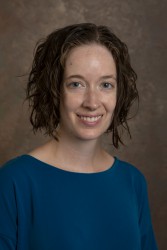
Mary Bowden specializes in British literature of the long nineteenth century, focusing particularly on environmental topics. Her current book project, “Plant Plots: Plant Science and British Narrative, 1800-1910” explores how nineteenth-century advances in plant science influenced how literary authors positioned plants in narrative fiction. Her work brings together current discussions in critical plant studies, science and literature, the environmental humanities, and narrative theory. She earned her PhD in literature with a concentration in Victorian studies from Indiana University. |
Martin Brückner
Martin Brückner is Professor in the English Department and currently serves as the Director of the Winterthur Program in American Material Culture. His teaching and research interests concentrate on American literature and history (C17 to C19); material culture studies; history of cartography; literary geography of the Atlantic World; print culture and the visual arts; and intellectual history. He earned his Ph.D. from Brandeis University and his M.A. from Johannes-Gutenberg-Universität Mainz in his native Germany. He has served as Co-Director of both UD’s Center for Material Culture Studies and the Delaware Public Humanities Institute. Professor Brückner is the author of two award-winning books, The Social Life of Maps in America, 1750-1860 (2017; Fred B. Kniffen Book Award) and The Geographic Revolution in Early America: Maps, Literacy, and National Identity (2006; Louis Gottschalk Book Prize). He is the editor of Early American Cartographies (2011) and co-editor of Modelwork: The Material Culture of Making and Knowing (2021; with Sandy Isenstadt and Sarah Wasserman); Elusive Archives: Material Culture Studies in Formation (2021; with Sandy Isenstadt); and American Literary Geographies: Spatial Practice and Cultural Production, 1500-1900 (2007; with Hsuan L. Hsu). His essays appear in American Quarterly, American Art, American Literary History, English Literary History, Winterthur Portfolio, Open Cultural Studies, and XVII-XVIII: Revue de la Societe d’Etudes Anglo-Americaines, and in various scholarly collections. He prepared the exhibition Common Destinations: Maps in the American Experience and contributed to exhibitions at the Library of Virginia and the Newberry Library. He has led workshops or seminars at Skidmore College, Lehigh University, the University of Kentucky, Universität Mainz, and together with Patricia Crain, at the American Antiquarian Society’s Summer Seminar in the History of the Book in American Culture. His research has been supported by numerous grants and post-doctoral fellowships, including the Andrew W. Mellon Foundation, the National Endowment for the Humanities, the Program in Early American Economy and Society at the Library Company of Philadelphia, the American Antiquarian Society, and the Obama Institute for Transnational American Studies. An elected member of the American Antiquarian Society, his work has been further recognized by the Society of Early Americanists Essay Prize (2007), the University of Delaware’s Francis Alison Young Scholar Award (2002) and its College of Arts and Science Excellence in Scholarship Award (2018). He currently serves as co-editor of the book series, Material Culture Perspectives, published by the University of Delaware Press, and he is the Principal Investigator of the digital humanities project, ThingStor: A Material Culture Database for Finding Objects in Literature and Visual Art (thingstor.org). |
Petra Clark
Petra Clark is an Instruction Librarian for Special Collections at the University of Delaware Library, Museums & Press. Since starting this role in 2023, her work has largely encompassed teaching and outreach using the collections, curating exhibitions in the library, and providing reference and research support. She is one of the curators of the exhibition What They Saved: Souvenirs and Mementos in Special Collections, on view in the Special Collections Gallery for the 2024-2025 academic year. Before becoming a library professional, Petra earned an MA and a PhD in English from the University of Delaware, with a focus on Victorian print, visual, and material culture. From 2011-2021, she taught undergraduate courses in composition, literature, and the liberal arts at UD, Rowan University, and the Delaware College of Art and Design (DCAD). Her scholarship has been published in peer-reviewed journals such as Victorian Periodicals Review and the Journal of Victorian Culture, and most recently, in the edited collection Fashioning the Self: Identity and Style in British Culture (2023). As a graduate student, Petra was awarded DELPHI and Friends of Rockwood fellowships through CMCS and is delighted to now contribute to the Center’s work as a member of the advisory committee. |
Kelly Cobb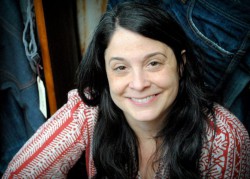
Kelly Cobb is an Associate Professor in The Department of Fashion and Apparel Studies. She teaches graduate and undergraduate courses on sustainability in the fashion industry, fashion communication and creative strategy. She conducts creative research in textiles, addressing wicked problems (overconsumption/textile waste, health/well-being) through project-based works that vary in scope, yet all have the textile as a point of entry or common thread. Derived from practice (from touching, making, learning and doing in a studio) her approach to design research adopts fiber, weave, dye, print processes as both method and metaphor in the creation of new knowledge. Materiality is a way of thinking, informing us through relationship to nature, humanity and to each other and the world around us. Projects in which she has had the opportunity to put these ideas into action include:
|
Jon Cox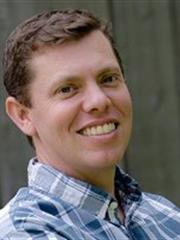
Jon Cox is an active explorer/photographer, he has traveled to all seven continents. He has been a University of Delaware faculty director of more than twenty photography based study abroad programs. Besides being named to two prestigious distinctions, namely a National Geographic Explorer and a New York Explorer’s Club National Fellow, Cox is the author of three books: Hadzabe, By the Light of a Million Fires, a 250-page documentary book on the Hadzabe, one of Tanzania’s last Hunter/Gathering Peoples; Close-up Digital Nature Photography; and, Digital Nature Photography. He currently is working on a cultural mapping project and fourth book on an indigenous community, the Ese’Eja who live outside of Bahuaja-Sonene National Park in the Amazon basin of Peru. |
Jay Custer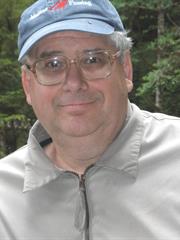
Jay F. Custer, Professor of Anthropology; Director, University of Delaware Center for Archaeological Research (Ph.D., Catholic University of America, 1979). Area specialization: Eastern North America, Middle Atlantic region, Delmarva Peninsula. Pertinent Research Interests: lithic technology systems (production and function), ceramic technology systems (production and function), analysis of the symbolic functions of Native American artifacts within social and ideological cultural systems (special emphasis on ceramic design motifs), experimental archaeological analysis of stone tools and thermally-altered stones (special emphasis on food procurement, processing, and cooking). |
Lu Ann De Cunzo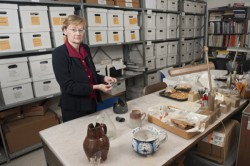
Lu Ann De Cunzo is a professor Anthropology at the University of Delaware and Interim Director, Museum Studies and Public Engagement. She earned a Ph.D. in American Civilization from the University of Pennsylvania. In her research and teaching she specializes in historical archaeology and anthropology with a focus on the 17th to early 20th century culture history of the Middle Atlantic region, and the heritage legacy of this era. She has directed public archaeological projects in Pennsylvania, Delaware and southern New Jersey in collaboration with historical organizations, public agencies, community groups, and students. Her research interests include urbanization and institutions, the cultures of agriculture, colonialism, and the rise of consumerism in the modern world. She is coediting New Stories from Old Things with Michele Anstine of the Delaware Historical Society, and is the author of “Borderland in the Middle: The Delaware Colony on the Atlantic Coast,” in Scandinavian Colonialism and the Rise of Modernity: Small Agents in a Global Arena. Among her other publications are Unlocking the Past: The Historical Archaeology of North America (coeditor, 2005); A Historical Archaeology of Delaware: People, Contexts, and the Cultures of Agriculture(author, 2004); and Historical Archaeology and the Study of American Culture (coeditor, 1996), and Reform, Respite, Ritual: An Archaeology of Institutions. The Magdalen Society of Philadelphia, 1800-1850 (1995). A past president of the Society for Historical Archaeology, she has worked to globalize the practice of historical archaeology in the U.S. Teaching: the undergraduate Introduction to Material Culture Studies course, diverse undergraduate historical archaeology courses—addressing issues of globalization and archaeology of the modern world, colonialism, African diaspora in North America and slavery, consumerism and industrial revolution, westward expansion, ethnic diversity, regionalism, public engagement, and archaeological field, lab, and analytical methods—graduate sections of the field methods and public engagement courses and occasionally of the material culture studies course, independent studies for graduate students re: archaeology and material culture studies, advising M.A. theses in American Material Culture Studies and Historic Preservation, serving on Ph.D. examining committees and dissertation committees re: archaeology and material culture studies for students in History of American Civilization and Preservation Studies Service: Executive Committees of Winterthur Program in American Material Culture Studies and Preservation Studies Ph.D. program; collaborating and consulting archaeologist to Delaware Historical Society (especially in New Castle), New Castle Historical Society, State of Delaware Division of Historical and Cultural Affairs, Old Swedes Foundation, American Swedish Historical Museum, New Jersey Historic Sites Council and in past years to Mt. Cuba Center and Coverdale Farm; active member and Past President of the Society for Historical Archaeology (the largest international professional association of my field) and active member and Past Chair of the Council for Northeast Historical Archaeology; current member of Editorial Board of Winterthur Portfolio and Left Coast Press’s Guide to American Artifacts Series. |
Rebecca L. Davis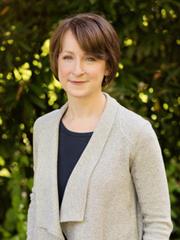
Rebecca L. Davis is an associate professor of history and holds a joint appointment in the department of women and gender studies. She specializes in U.S. history since the Civil War, with a particular focus on histories of gender, sexuality, religion, and race. In her sophomore seminar, “American Ethnic Identities,” her students interpret material culture objects as well as written sources to explain how ideas about ethnicity and race have changed over time in the United States. The class culminates in the creation of a website. Davis earned her B.A., M.A., and Ph.D. in history from Yale and has held a postdoctoral fellowship at the Center for the Study of Religion at Princeton. She is author of More Perfect Unions: The American Search for Marital Bliss (Harvard University Press, 2010) and Public Confessions: The Religious Conversions that Changed American Politics (UNC Press, forthcoming fall 2021). She is co-editor of Heterosexual Histories (NYU Press, 2021). Davis serves as a producer and story editor for the podcast Sexing History. |
Abigail Donovan
Abigail Donovan’s glass and light compositions were featured in THE COLORS ARE LIKE WORDS THAT ARE NOT WORDS BUT COLORS, a 2023 solo exhibition at the Shirley Fiterman Art Center, New York, New York and she is a 2025 artist-in-residence at Acadia National Park. Frequently appearing as part of artist collective the 181, Donovan has had exhibitions and performances at a variety of national and international venues, including most recently: in 2024 WE WHO LOOK AFTER with Prospect Art Foundation, Los Angeles, CA; the 2024 Artist in Fire Residency with Confluence Lab, University of Idaho; the 2023 Volcanic Attitude Contemporary Art Festival, Sicily, Italy; and in 2022 The Absolute Value of Infinity on its Side (O Dissipation) with Locust Projects in Miami, FL. Donovan holds an MFA from Cranbrook Academy of Art and a BA from Swarthmore College. |
Lowell Duckert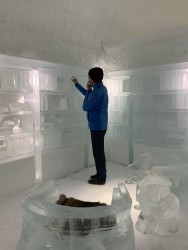
Lowell Duckert received his B.A. from Western Washington University (2004), his M.A. from Arizona State University (2007), and his Ph.D. from The George Washington University (2012). He specializes in early modern drama and travel literature, environmental criticism, new materialism (especially actor-network theory), and water studies. He has published on various topics such as glaciers, polar bears, the color maroon, rain, fleece, mountaintop removal mining, and lagoons. In general, his work attempts to reshape present-day relations between humans and nonhumans by plumbing premodern wet worlds. His book For All Waters: Finding Ourselves in Early Modern Wetscapes was published by University of Minnesota Press in 2017 and was short-listed for the SLSA’s Michelle Kendrick Memorial Book Prize for the best academic book on literature, science, and the arts. With Jeffrey Jerome Cohen, he is the editor of “Ecomaterialism” (postmedieval 4:1 [2013]); Elemental Ecocriticism: Thinking with Earth, Air, Water, and Fire(2015); and Veer Ecology: A Companion for Environmental Thinking (2017). With Craig Dionne, he is the editor of “Shakespeare in the Anthropocene” (Early Modern Culture 13 [2018]). He is currently researching two book projects that critically engage with contemporary cryo-politics: the first investigates the strange vitality of ice witnessed by sixteenth- and seventeenth-century writers of the north, while the second follows the compacted object of the snowball. |
Laura Helton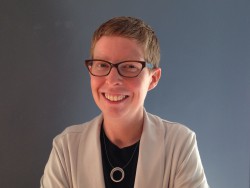
Laura Helton specializes in American literature and history of the twentieth century with an emphasis on African American print culture and public humanities. Her research and teaching interests include archival studies, memory and material culture, gender and sexuality, and literary practices of the black freedom struggle. Her current book project, Collecting and Collectivity: Black Archival Publics, 1900-1950, examines the emergence of African American archives and libraries to show how historical recuperation shaped forms of racial imagination in the early twentieth century. Professor Helton is co-editor of a special issue of Social Text on “The Question of Recovery: Slavery, Freedom, and the Archive” (2015) and a special issue of African American Review on the Afro-Puerto Rican bibliophile and curator Arturo Schomburg (forthcoming). Her work on Black information practices has appeared in PMLA (2019) and in the edited volumes Against a Sharp White Background: Infrastructures of African American Print (2019) and Information: Keywords (2021). She has received fellowships from the Schomburg Center for Research in Black Culture Scholars-in-Residence Program (2019-2020), the National Endowment for the Humanities (2019), the Carter G. Woodson Institute for African-American and African Studies at the University of Virginia (2013-2015), and the Center for Humanities & Information at Penn State (2015-2017). Professor Helton’s interest in the social history of archives arose from her earlier career as an archivist. She has surveyed and processed collections that document the civil rights era, women’s movement, and American radicalism for several cultural institutions, including the Mississippi Digital Library, Tamiment Library & Robert F. Wagner Labor Archives, CityLore, and the Schomburg Center for Research in Black Culture. |
Jason Hill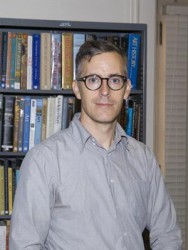
Professor Jason Hill specializes in the histories of modern and contemporary art, photography, and visual culture, focusing on American art’s longstanding and always dynamic relationship with the cultures of mass media and journalism. Jason received his Ph.D. in Art History at the University of Southern California in 2011, where he also completed the Visual Studies Graduate Certificate. He completed his M.A. in Art History at Tufts University in 2004 and his B.A. in Political Science at the University of Massachusetts, Amherst in 2001. Before joining the Department of Art History at the University of Delaware in 2015, Jason was 2014-15 Andrew W. Mellon Fellow at the New-York Historical Society and 2011-13 Terra Foundation Fellow at the Institut National d’Histoire de l’Art in Paris. He has also taught at the École Normale Supérieure, Sciences Po, Université Paris X Nanterre, and UNLV. Jason is co-editor (with Vanessa R. Schwartz) of Getting the Picture: The Visual Culture of the News (Bloomsbury, 2015), which assembles an interdisciplinary and international team of scholars to chart the shifting terrain of pictorial journalism from the early nineteenth century to the present, from the lithograph and wood-engraving to photojournalism and Flickr. The problem of visual journalism as a question of material culture is at the heart of this volume’s inquiry. Jason’s forthcoming book, Artist as Reporter: Weegee, Ad Reinhardt, and the PM News Picture, draws on the analytical resources of both art history and media studies in order to illuminate the pragmatic value of modern art’s essential inquiry into problems of representation and medium in enriching the visual culture of print journalism in the 1940s, considering that newspaper’s full gamut of communicative forms from page-design, exhibitions, photographs, and maps, to diagrams and comics. Both of these projects engage Jason’s continuing commitment in understanding the productive place of art and its histories within (rather than against) modern culture’s more expansive visual field. |
Jessica L. Horton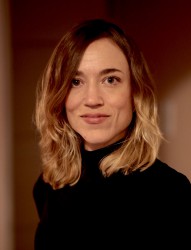
Professor Jessica L. Horton is a scholar of modern and contemporary art, specializing in Native American politics, globalization, and environmental justice. Her courses span global contemporary, American, and Indigenous topics, with a focus on the transnational and transcultural movement of people, objects, and ideas. Her book, Art for an Undivided Earth: The American Indian Movement Generation (Duke University Press, June 2017), was supported by the Andrew W. Mellon Foundation Art History Publication Initiative and a Wyeth Foundation for American Art publication grant. She was recently awarded a Clark Art Institute Fellowship, a Andy Warhol Foundation Book Award, and a Georgia O’Keeffe Museum Academic Fellowship in American Modernism for her book-in-progress, Earth Diplomacy: Indigenous American Art and Reciprocity, 1953–1973, which charts the revitalization of Indigenous ecology and diplomacy through Cold War arts initiatives. A third project, Ecolonial Holism, centers Indigenous creative practitioners in an expanded genealogy of ecological art and thought from the final years of Indian Removal to the recent Idle No More and No Dakota Access Pipeline movements. She is an affiliate of the Delaware Environmental Institute and the Center for Material Culture Studies. Professor Horton earned a M.A. and Ph.D. in Visual and Cultural Studies at the University of Rochester and a B.A. in Art History and Political Science at the University of California, San Diego. Her research has been supported by a National Endowment for the Humanities/Getty Research Institute Postdoctoral Fellowship, a Smithsonian American Art Museum/National Museum of the American Indian Postdoctoral Fellowship, a Wyeth Fellowship at the Center for Advanced Study in the Visual Arts, National Gallery of Art, a Social Science Research Council International Dissertation Research Fellowship, and a Terra Foundation for American Art Summer Residency in Giverny, among other awards. Selected Publications Art for an Undivided Earth: The American Indian Movement (Duke University Press, June 2017). “Ecolonial Holism,” Panorama: Journal of the Association of Historians of American Art 5, no. 1 (Summer 2019), “Ecocriticism” Bully Pulpit, ed. Karl Kusserow, editions.lib.umn.edu/panorama/article/ecocriticism/ecolonial-holism/. “Performing Paint, Claiming Space: The Santa Fe Indian School Posters on Paul Coze’s Stage in Paris, 1935,” Transatlantica: Revue d’études américaines 2 (2019), special issue, “Dialoguing the American West in France,” eds. Emily Burns and Agathe Cabau, https://journals.openedition.org/transatlantica/11220. “‘All Our Relations’ as an Eco-Art Historical Challenge: Lessons from Standing Bear’s Muslin,” in Ecologies, Agents, Terrains, eds. Christopher Heuer and Rebecca Zorach (Clark Art Institute and Yale University Press, 2018), 73–93. “Indigenous Artists Against the Anthropocene,” Art Journal 76:2 (Summer 2017). “Plural Diplomacies Between Indian Termination and the Cold War: Contemporary American Indian Paintings in the ‘Near East’, 1964–1966,” Journal of Curatorial Studies, special issue, The Art of Cultural Diplomacy (Spring 2017). “Jimmie Durham’s Stones and Bones,” in Jimmie Durham: At the Center of the World, ed. Anne Ellegood (The Hammer Museum & DelMonico Books/Prestel, 2017): 78-85. “Ojibwa Tableaux Vivants: George Catlin, Robert Houle, and Transcultural Materialism,” Art History 39:1 (Feb. 2016): 124-151. “A ‘Cloudburst’ in Venice: Fred Kabotie and the U.S. Pavilion of 1932,” American Art, 29:1 (March 2015): 54–81. “Art History’s Tangled Legs,” in Kay WalkingStick: An American Artist, ed. Kathleen Ash-Milby (Smithsonian Institution National Museum of the American Indian, 2015), 145-148. “Painter/Traveler/Diplomat,” in Fritz Scholder: Super Indian, 1967–1980, John Lukavic, Jessica Horton, and Eric Berkemeyer (Denver Art Museum & Prestel, 2015), 41–53. (and Janet Catherine Berlo), “Pueblo Painting in 1932: Folding Narratives of Native Art into American Art History,” in The Companion to American Art History, eds. Jennifer Greenhill, John Davis, and Jason LaFountain (Wiley-Blackwell, 2015), 264-280. (and Cherise Smith), “The Particulars of Postidentity,” eds. Jessica L. Horton and Cherise Smith, American Art, 28:1 (Spring 2014): 2–8. (and Janet Berlo), “Beyond the Mirror: Indigenous Ecologies and ‘New Materialisms’ in Contemporary Art,” Third Text, special issue, Contemporary Art and the Politics of Ecology, ed. T. J. Demos, 27:1 (January 2013): 17–28. “Of Mimicry and Drag: Homi Bhabha and Kent Monkman,” in Theorizing Visual Studies: Writing Through the Discipline (Routledge, 2013), 169–191. “Alone on the Snow, Alone on the Beach: ‘A Global Sense of Place’ in Atanarjuat and Fountain,” Journal for Transnational American Studies, special forum, Charting Transnational Native American Studies, eds. Philip J. Deloria, et al., 4:1 (June 2012): 1–25. “A Shore Without a Horizon: Locating as Looking Anew,” Shapeshifting: Transformations in Native American Art (Peabody Essex Museum & Yale University Press, 2012), 50–63. “Textured Stories: Three California Baskets,” American Indian Art from the Thaw Collection (Fenimore Art Museum, 2010), 102–109.
|
Sandy Isenstadt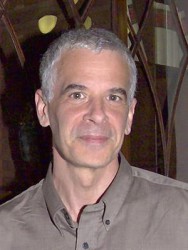
Sandy Isenstadt is an architectural historian whose interest in material culture is evident in his writings that treat topics such as picture windows, refrigerators, landscape views, kitchen design and real estate appraisal. His most recent book, “Electric Light: An Architectural History,” examines the novel luminous spaces introduced by electric lighting, with chapters on switches, automobile headlights, factory lighting, illuminated signage and blackouts. His classes, touching on topics such as memorials and monuments and the role of electricity in modern life, likewise reflect this interest in the material aspects of the built environment as well as its history, form and use. |
Neri de Kramer
I am an assistant professor of anthropology in the University of Delaware’s Associate in Arts Program in Wilmington, where I also serve as faculty coordinator. My research interests include the anthropology of North America, food, gender, the family, and the reproduction of social class. My particular interest is in human food practices and the process by which consumers form, express, and reproduce identities through food. I am strongly committed to equity and inclusion, and my educational area of expertise is inclusive pedagogy and the institutional practices that promote success for Black, Hispanic, Asian, Native, mixed race, first generation and low-income students. I also freelance as qualitative researcher and consultant for corporate and nonprofit organizations to help them determine how, where, and why their products fit into consumers’ lives. |
Mark Samuels Lasner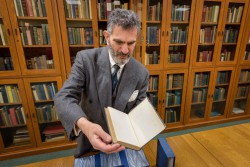
Collector, bibliographer, and typographer Mark Samuels Lasner is Senior Research Fellow at the University of Delaware Library, Museums and Press. A graduate of Connecticut College, he is the author of The Bookplates of Aubrey Beardsley (Rivendale Press, 2008), A Bibliography of Enoch Soames (Rivendale Press, 1999), The Yellow Book: A Checklist and Index (Eighteen Nineties Society, 1998), A Selective Checklist of the Published Work of Aubrey Beardsley (Thomas G. Boss Fine Books, 1995), and William Allingham: A Bibliographical Study (Holmes Publishing Co., 1993); as well as co-authored (with Margaret D. Stetz) books such as England in the 1880s: Old Guard and Avant-Garde (University of Virginia Press, 1989), England in the 1890s: Literary Publishing at the Bodley Head (Georgetown U Press, 1990), and The Yellow Book: A Centenary Exhibition (Houghton Library, 1994). His articles and notes have appeared in the Book Collector, Browning Institute Studies, Notes and Queries, and other journals. He has organized or co-curated exhibitions held at numerous institutions, including the University of Virginia Library, Houghton Library and the Fogg Art Museum at Harvard University, Georgetown University Library, Bryn Mawr College Library, Liverpool Central Library, and the Rosenbach of the Free Library of Philadelphia. More recently, he co-curated with Alexander L. Ames “Grolier Club Bookplates, Past & Present,” November 2016–January 2017 at the Grolier Club in New York. Active in numerous bibliophile and bibliographical organizations, Samuels Lasner was the 2003 recipient of the Sir Thomas More medal from the University of San Francisco, awarded to honor the spirit of “private collecting, a public benefit.” In 2016 Samuels Lasner donated his collection of more than 9.,500 rare books, manuscripts, graphics, and ephemera relating to British literature and art of the period 1850–1900 to the University of Delaware Library. More recently, he co-curated with Margaret D. Stetz “‘Everything is going on brilliantly’: Oscar Wilde and Philadelphia” at the Rosenbach Museum and Library, January–June 2015, and with Alex L. Ames “Grolier Club Bookplates, Past & Present,” November 2016–January 2017 at the Grolier Club in New York. Active in numerous bibliophile and bibliographical organizations, Samuels Lasner was the 2003 recipient of the Sir Thomas More medal from the University of San Francisco, awarded to honor the spirit of “private collecting, a public benefit.” In 2016 Samuels Lasner donated his collection of more than 9.,500 rare books, manuscripts, graphics, and ephemera relating to British literature and art of the period 1850–1090 to the University of Delaware Library. |
Arwen Mohun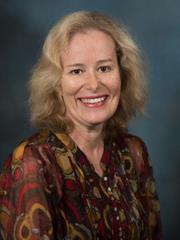
Dr. Mohun specializes in the social and cultural historian of technology. Her publications include Steam Laundries: Gender, Work, and Technology in the United States and Great Britain, 1880-1940 (Johns Hopkins University Press, 1999); His and Hers: Gender, Consumption and Technology (University of Virginia Press, 1998) co-edited with Roger Horowitz; and Gender and Technology: A Reader (Johns Hopkins University Press, 2003) co-edited with Nina Lerman and Ruth Oldenziel. She is currently President of the Society for the History of Technology. In her most recent book, Risk: Negotiating Safety in American Society (Johns Hopkins University Press, 2013), Professor Mohun explores the changing ways Americans have understood and managed everyday risk from the 18th century to the present. Risk was awarded the 2014 Ralph Gomery Prize from the Business History Conference. |
Debra Hess Norris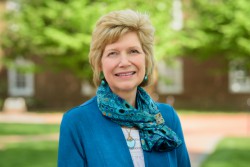
Debra Hess Norris is Chair of the Art Conservation Department, Director of the Winterthur/University of Delaware Program in Art Conservation, and Professor of Photograph Conservation at the University of Delaware. Since 1985, Norris has authored more than 45 articles and book chapters on care and treatment of photographic materials, emergency response, ethics, and conservation education; and taught more than 140 workshops and seminars for conservators and allied professionals globally – across North America and Europe and in the Middle East, South America, Asia and Africa – most recently Cuba. As chair, Norris has raised more than $21 million dollars to support the Department of Art Conservation and preservation initiatives worldwide. She has co-led the Middle East Photograph Preservation Initiative (MEPPI) with the Arab Image Foundation, The Metropolitan Museum of Art, and the Getty Conservation Institute. With Nora Kennedy and other colleagues, she has launched a similar photograph preservation training initiative in Sub-Saharan Africa with workshop in April 2014 in Benin. Norris co-edited a compilation of fundamental writings in the field of photograph conservation with Jennifer Jae Gutierrez – Issues in the Conservation of Photographs – published by the Getty Conservation Institute in 2010. She was the chair of Heritage Preservation (2003- 2008) and president of the American Institute for the Conservation of Historic and Artistic Works (AIC) (1993-97). She has served as president of the Conservation Center for Art and Historic Artifacts Board (CCAHA), US commissioner to UNESCO, and project co-director of The Andrew W. Mellon Collaborative Workshops in Photograph Conservation. Today she continues to serve on many boards and visiting committees, including the HBCU Library Alliance, the Foundation for the American Institute for Conservation, the Visiting Committee for the Department of Photographs at the Metropolitan Museum of Art, the American Friends for the Natioanl Gallery of Denmark, CCAHA Board, and the University Of Delaware Board Of Trustees. In 2002, Norris was inducted into the University of Delaware’s Alumni Wall of Fame. Norris received the Rutherford John Gettens Merit Award for outstanding service to the AIC (1998), the Sheldon and Caroline Keck Award for excellence in the education and training of conservation professionals (2004), the AIC University Products Award for distinguished achievement in the conservation of cultural property (2008), the College Art Association – AIC Award for Distinction in Scholarship and Conservation (2017) and the UD Alison Faculty Award (2018). Norris has also served in many senior administrative roles in the College of Arts and Sciences as well as vice provost for graduate and professional education. |
Cindy Ott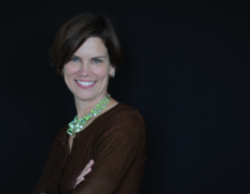
Cindy Ott is an associate professor in the history department at UD. Her fields of study include food and culture, U.S. environmental history, material and visual culture, and race and ethnicity studies. Her first book, Pumpkin: The Curious History of an American Icon, was published with William Cronon’s Weyerhaeuser Environmental Books at the University of Washington Press in 2012. Her current project Biscuits and Buffalo: Squashing Myths about Food in Indian Country looks at the ways Plains Indians have created food traditions in the twentieth-century that support a sense of American Indian identity. Cindy has a long career in public humanities and continues to curate exhibitions. She is currently the President of the Society of Fellows at the Rachel Carson Center for Environment and Society in Munich, Germany and an executive board member of the American Society for Environmental History. |
Nina Owczarek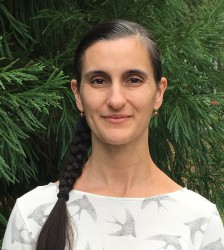
Nina Owczarek is Assistant Professor in Art Conservation at the University of Delaware (UD) and a graduate of the Conservation Center, Institute of Fine Arts, New York University. Before joining the UD Faculty, she was most recently Associate Conservator at the University of Pennsylvania Museum of Archaeology and Anthropology (Penn Museum), where she worked for nine years. There, her primary responsibility was the evaluation and preparation of artifacts for travel and display on loan. In 2016, she managed the international symposium, Engaging Conservation: Collaboration Across Disciplines, in honor of the Penn Museum Conservation Department’s 50th-year anniversary. She was lead editor for the 2017 publication resulting from that event. Prior to the Penn Museum, Owczarek was Smithsonian Fellow in Conservation at the National Museum of African Art, Assistant Conservator at the Gerald R. Ford Conservation Center, and Graduate Intern at the Freer and Sackler Galleries. Owczarek has worked on various other short-term and private projects. Owczarek served as Secretary/Treasurer for the Object Specialty Group (2016-2020) and was a member of the Education and Training Committee (ETC member 2014-2020, Vice Chair 2018, Chair 2019), both of the American Institute of Conservation (AIC). She is a Fellow member of AIC. |
Alison Parker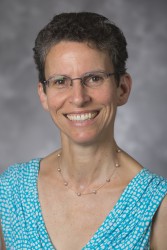
Alison M. Parker is Chair and Richards Professor of American History at the University of Delaware. She double majored in art history and history at the University of California, Berkeley and earned a Ph.D. in history from the Johns Hopkins University. Parker teaches about the intersections of gender, race, disability, citizenship and the law in U.S. history. In 2017-2018, Parker was an Andrew W. Mellon Advanced Fellow at the James Weldon Johnson Institute for the Study of Race and Difference at Emory University, where she worked on her current book project, a biography of the civil rights activist and suffragist Mary Church Terrell. Her book, Unceasing Militant: The Life of Mary Church Terrell is forthcoming with the University of North Carolina Press in its John Hope Franklin Series in African American History and Culture. Her op-ed “When White Women Wanted a Monument to Black ‘Mammies,’” appeared in the New York Times Sunday Review. Among other publications, Parker has two monographs, Articulating Rights: Nineteenth-Century American Women on Race, Reform, and the State (2010) and Purifying America: Women, Cultural Reform, and Pro-Censorship Activism, 1873-1933 (1997). She is committed to building a coalition of students, faculty, and staff who are promoting a wide-ranging anti-racism agenda. |
Lauren Petersen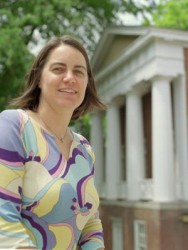
Lauren Hackworth Petersen, Professor, Dept. of Art History (Joint appointment in Women and Gender Studies), specializes in ancient Roman art and architecture. Her most recent book, The Material Life of Roman Slaves (co-authored with Sandra Joshel, Cambridge University Press, 2014), intervenes in scholarly debates on the archaeology of Roman slavery by searching for ways to see slaves in urban houses, city streets, workshops, and villas—to make slaves visible in the material remains where literature, law, and art tells us they were present. She is currently working on the archaeology of Roman religion and ritual, in addition to thinking about Roman cities and alternative narratives of their physical remains. Professor Petersen’s research and teaching interests include art in the everyday life of ancient Romans, the visual and material culture of Pompeii, classical art revivals and their meanings, and ancient constructions of gender and sexuality. |
Keerthi Potluri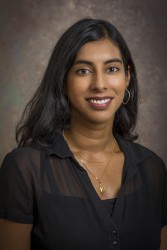
Keerthi Potluri specializes in urban studies and social and political thought. Her research focuses on the construction of cities, memorials, and public space, mostly in North America, and she has published writing on urban parks and waterways. Her current work explores the parallel design of the state alongside urban public spaces through discourses of the public good, ethics, and memory at sites that include the World Trade Center memorial plaza, a New York City bus depot, and Freshkills Park in Staten Island.
Prior to joining Delaware, she held research positions at New York University and the University of Pennsylvania. Alongside her academic work, she has developed communications strategies for the ACLU and the Central Park Conservancy. She received her MA and PhD in Rhetoric from the University of California, Berkeley.
|
Erik Rau
Erik Rau is Director of Library Services for Hagley Museum and Library, which documents this history of Americans‘ experience with the free enterprise system, especially businesses, technology, and industrial design. He oversees all of the Library’s operations, including its collections development and management, conservation, programming and outreach. He joined the staff at Hagley in July 2011. He regularly speaks to groups about the importance of preserving records documenting the experience of business, innovation, and enterprise. Raised in Oregon, Rau trained in industrial engineering as well as science and technology studies (STS) as a Stanford University undergraduate and earned his doctorate in History and Sociology of Science at the University of Pennsylvania. He has published on the history of operations research and the systems sciences, particularly their spread throughout industry, libraries, and the military since World War II. Between 1997 and 2011, he developed and taught a wide variety of history courses to graduates and undergraduates at Drexel University. Since 2012, he has co-directed the Delaware Public Humanities Institute (DelPHI) at the University of Delaware, an intensive two-week introduction to public engagement strategies for advanced humanities graduate students interested in material culture studies. Rau has also served on the board of the Delaware Humanities Council from 2007 to 2014, and as its chairman during 2012 and 2013. |
Thomas Rocek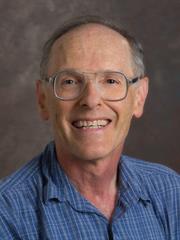
Tom Rocek is an archaeologist specializing in the United States Southwest with an additional concentration on the early Neolithic of central Europe. His research has included studies of historical Navajo settlements on the Navajo Nation (Navajo Multi-Household Social Units: Archaeology on Black Mesa, Arizona) and Formative through Late Prehistoric research in New Mexico, particularly within the Jornada branch of the Mogollon archaeological culture (The Henderson Site Burials: Glimpses of a Late Prehistoric Population in the Pecos Valley, with John Speth; Late Prehistoric Hunter-gatherers and Farmers of the Jornada Mogollon with Nancy Kenmotsu (editors) [2018/paperback with updated introduction 2023]). His research interests include middle-range societies, agricultural origins, mobility and sedentism, quantitative analysis, and particularly comparative approaches to archaeological analysis (Seasonality and Sedentism : Archaeological Perspectives from Old and New World Sites, with Bar-Yosef (editors)). Most recently, these comparative interests have included both the Formative period in the Southwestern United States and the Neolithic period in the Czech Republic. He is particularly interested in a comparative perspective to examine the use of material culture by populations undergoing shifting patterns of cultural adaptation, and conversely, the analytical use of material culture in understanding those patterns. |
Catharine Dann Roeber
In addition to teaching and leading the Academic Affairs Division at Winterthur Museum, Garden & Library, Catharine Dann Roeber is executive editor of Winterthur Portfolio: A Journal of American Material Culture and Director of Winterthur’s Research Fellowship Program. Her work centers supporting, advocating for, and participating in endeavors to build a more equitable and inclusive future for cultural heritage, decorative arts, and material culture studies, and conservation through exhibitions, programs, teaching, mentoring, and community collaboration. Catharine teaches graduate courses for the Winterthur Program, including American Interiors, Exhibitions and Interpretation, British Design History and additional independent studies and field study courses. Her areas of research include decorative arts and material culture, culinary history, history of print and ephemera, and Pennsylvania material and architectural heritage. She recently co-edited The Cambridge Handbook of Material Culture and curated the exhibition Transformations: Contemporary Artists at Winterthur. Roeber draws on her background of international experience with archeology departments, research libraries, museums and cultural non-profits in encouraging people to enjoy and study stuff. |
Vimalin Rujivacharakul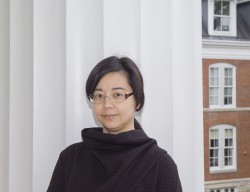
Professor Vimalin Rujivacharakul’s research and writings focus on the interplay between architectural history, intellectual history, and cultural anthropology. She has published on architectural history and historiography, Sino-European intellectual history, history of cartography, history of collecting, and materiality of things. Her scholarship has been recognized with awards and fellowships from the Institute for Advanced Study (IAS, Princeton), Getty Research Institute (Los Angeles), Needham Research Institute (Cambridge, UK), Andrew W. Mellon Foundation, Social Science Research Council (SSRC), Japan Society for the Promotion of Science, Chiang Ching-kuo Foundation, and the Graham Foundation for Advanced Studies in the Fine Arts. Her current research examines the construction of world architectural discourse in visual and textual representations. Professor Rujivacharakul supervises graduate students in both Art History and Art Conservation, and has served as reader and examiner of dissertations and theses for graduates both within and outside of the USA. Her current doctoral students study Material Culture and Materiality, History of Sino-European Lacquerware, Vernacular Architecture and Architectural Preservation in China’s Borderlands. |
Curtis Small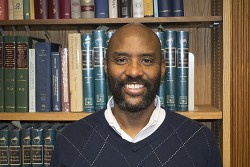
Curtis Small is a librarian and coordinator of public services for the Special Collections department at University of Delaware Library. He regularly teaches and lectures based on books and manuscripts from the collection. In 2017, he curated the exhibition Issues and Debates in African American Literature at UD Library. In 2019, Curtis was co-curator of Drawing Connections: Illustration and the Written Word, an exhibition at University of Delaware Museums. In that same year, he was a co-organizer of the Black Bibliographia conference, sponsored by the Center for Material Culture Studies at UD. Curtis has interests in literature, book history and African American print culture in particular. He also works to increase racial diversity and equity among professionals in the fields of archives and special collections. He holds a PhD in French from New York University and an MLIS degree from the School of Library and Information Science at Simmons University.
|
Margaret Stetz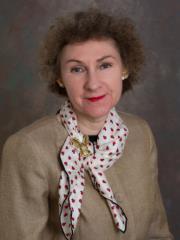
Margaret D. Stetz is the Mae and Robert Carter Professor of Women’s Studies and Professor of Humanities at the University of Delaware. She received her BA (summa cum laude) from Queens College, the City University of New York; her MA from the University of Sussex, UK; and a second MA, as well as her PhD, from Harvard University. Before joining the UD faculty in 2002, she taught at the University of Virginia and at Georgetown University. Her teaching interests include women and material culture, women’s representations of war, women’s comedy, and late-Victorian feminism. As well as being author of books such as British Women’s Comic Fiction, 1890-1990; Facing the Late Victorians; and Aubrey Beardsley, 150 Years Young, as well as co-editor of volumes such as Legacies of the Comfort Women of WWII and Michael Field and Their World, she has published more than 130 essays. These have appeared in journals ranging from Victorian Studies to the Journal of Human Rights Practice. Among her recent essays (all published in 2024) are “Netta Syrett’s Afterlife: From London to Hollywood” (in Volupté: Interdisciplinary Journal of Decadence Studies); “Ella Erskine, Elkin Mathews, and the ‘Long Aesthetic Century'” (in Women’s Writing); “Class and Classrooms: Teaching Jane Eyre with Adele Grace and Celine” (in Victorian Review); “Documenting War Crimes Onstage in Kyo Choi’s The Apology” (in Humanities Bulletin); “A Real New Woman: Covert Progression and Character in Henry James’s ‘Paste,’” which was co-written with Jie Hu (The Henry James Review), and the “Afterword: The Future of Egerton Studies” for the edited volume George Egerton: Terra Incognitas (Routledge). She has been curator or co-curator of more than a dozen major exhibitions on gender, visual arts, literature, and print culture at venues that include the Henry B. Plant Museum (Tampa, FL); the National Gallery of Art Library (Washington, DC); Houghton Library, Harvard University (Cambridge, MA); Liverpool Central Library (Liverpool, UK); Bryn Mawr College Library (Bryn Mawr, PA); the Rosenbach Library and Museum (Philadelphia, PA); the Grolier Club (NYC); and the New York Public Library (NYC). She has delivered many invited guest lectures at universities around the world, including Trinity College, Oxford University; Cardiff University; the University of Geneva, Switzerland; Ewha Women’s University, Seoul, South Korea; the University of Limerick, Ireland; and Keio University, Japan, as well as at public humanities events such as the Ibsen Festival, Bergen, Norway. She is also a member of the editorial boards of a number of journals, such as Victorian Literature and Culture; Victorian Periodicals Review; Papers on Language and Literature; and Nineteenth-Century Studies, and she serves on the editorial boards of several scholarly monograph series, such as the “Gender and Genre” series (Routledge) and “Nineteenth-Century Writing and Culture” (Palgrave Macmillan). In 2015, she was named by Diverse: Issues in Higher Education magazine to its list of the top 25 women in higher education. In spring 2017, she was a recipient of a Korea Foundation fellowship, selected by the Republic of Korea’s Foreign Ministry to represent the United States as a “distinguished academic” and to visit Seoul for the purpose of cultural and educational exchange. She is also the author of more than 100 poems published in anthologies and magazines (both online and print), along with being the Poetry Editor of The Steinbeck Review (published by Pennsylvania State University Press). |
Lois Stoehr
Lois Stoehr came to the College of Arts and Sciences after many years at Winterthur Museum, Garden & Library, where she empowered people of all ages to learn and grow through collection-inspired programs designed to nurture creativity, curiosity, and community. As a museum educator she mentored many UD interns (who were invaluable!) and taught as an adjunct professor for the UD Museum Studies program. She earned her B.A. in history from the College of William and Mary and her M.A. through the Winterthur Program in Early American Culture. She enjoys helping students in the arts and humanities navigate their professional paths forward, guided by their unique interests and values. |
Joyce Hill Stoner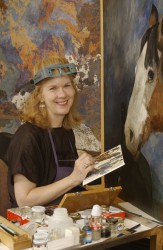
Joyce Hill Stoner received her B.A. from William and Mary in 1968 (Phi Beta Kappa, summa cum laude, with a major in Fine Arts and honors project in painting conservation). She received her M.A. from the NYU Institute of Fine Arts in 1970 and her Diploma in Conservation from the NYU Conservation Center in 1973. She was a Kress Visiting Scholar with John Brealey at the Metropolitan Museum (1980), and a Getty Visiting Scholar with Andrea Rothe at the Getty Museum (1985). In 1995 she completed a Ph.D. in Art History from the University of Delaware, focusing on the techniques of paintings, lithographs and decorated interiors by James McNeill Whistler. She began a pre-conservation program at V.C.U. in 1975. Stoner became the head paintings conservator at Winterthur in 1976, head of the conservation section in 1980, and served as Director of WUDPAC from 1982 to 1997. She became Chair in 1990 when WUDPAC became part of a Department, along with the new Ph.D. program in Art Conservation Research, which she squired through University and Winterthur Academic Committee approval. She was promoted to a full professorship in 1996 and resigned as Chair in 1997. She is now the Director of the UD Preservation Studies Doctoral Program. Stoner has written over 120 articles or book chapters. She co-edited a multi-author 890-page Butterworth-Routledge book on The Conservation of Easel Paintings, in which was published in November 2012; a second, revised edition was published in November 2020, with chapters by 92 international authors. She was senior conservator for the team treating Whistler’s Peacock Room at the Freer from 1987 to 1992 and supervised the treatment of a 19’ x 60’ N. C. Wyeth mural in 1998. She has carried out treatments for the Freer Gallery of Art, Colonial Williamsburg, the Virginia Museum of Fine Arts, the Brandywine River Museum, the Wyeth family, and various private collectors; she continues an active program of treating paintings in the presence of the undergraduate and graduate students she is supervising. Her portrait was painted by Andrew Wyeth. She guest curated the show FACTORY WORK: WARHOL, WYETH, AND BASQUIAT and wrote for and coordinated authors for the catalogue. The show appeared in three venues in 2006-07. She co-curated another exhibition, WYETH VERTIGO, for the Shelburne Museum, summer 2013. For the field, Stoner has served as Executive Director for the Foundation of the American Institute for Conservation (FAIC) from 1975-1979, coordinator of the FAIC oral history project (1975-present), Managing Editor of Art and Archaeology Technical Abstracts (1969-1985), and as a grant reviewer for the NMA, IMS, FAIC, Kress, and Getty Grant Program. She served as Vice President of the College Art Association until 2005 and on the IIC Council (as Vice President) and the Delaware State Arts Council until 2010; she continues to serve on the boards of the Wyeth Foundation for American Art, the AATA Board of Editors for the Getty Conservation Institute, and the U.S. Senate Art Advisory Committee. She delivered the keynote address for the Rembrandt Histories conference at the Rijksmuseum in 2018; her talk is to be published in 2021. Stoner was awarded the AIC University Products Lifetime Achievement Award in 2003, the AIC Paintings Specialty Group Award “for outstanding contributions to the field of paintings conservation” and the College Art Association and Heritage Preservation Award for Distinction in Scholarship and Conservation, both in 2011; in 2020 she was awarded the Sheldon and Caroline Keck Teaching Award from the American Institute for Conservation and she was awarded the status of Honorary Fellowship in the International Institute for Conservation, (She is the 36th Honorary Fellow since 1950; the first awardee was Edward Waldo Forbes, founding father of the Fogg Art Museum with the first US interdisciplinary conservation lab and training program. She is the first female graduate of a US conservation program to receive this honor.) Dr. Joyce Hill Stoner offers a practical internship to allow ARTC students to accumulate pre-graduate school conservation experience treating paintings and painted surfacesat Winterthur on Wednesdays from 2 to 8:30 during the fall semester, pre-pandemic. In fall of 2020, she offered UD undergraduates a hybrid internship, treating a WWI Harlem Hellfighters diorama from the Tuskegee Legacy Museum and a Thai painting from the Walters Art Museum in the Winterthur Museum paintings conservation studio combined with online reading seminars on important technical art history and conservation publications. |
Kaitlyn Tanis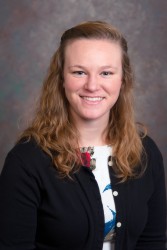
Kaitlyn Tanis is the History and Social Sciences Librarian at University of Delaware’s Library, Museums and Press. Kaitlyn is the subject librarian who works with the Center for Material Culture Studies. If you have questions about library resources, need research help, have suggestions for books and electronic material to add to the collection, or are curious about library services – please reach out!
|
Kedron Thomas
Kedron Thomas, Ph.D., is an associate professor in the Department of Anthropology at the University of Delaware. She is a cultural anthropologist with expertise in textiles, clothing, and fashion, especially the diversity of what people wear and how it is made. She is interested in the production of material culture, the cultural politics of style and identity, the globalization of trade and legal frameworks, cultural and ethical dimensions of entrepreneurship and business, race and ethnicity, and current environmental sustainability efforts in the fashion industry. Thomas’ research on clothing and fashion spans traditional textile production in the Guatemalan highlands, the manufacture and circulation of “knockoff” fashions in Central America, and the efforts of fashion industry professionals in the United States and United Kingdom to address pressing problems of environmental degradation and labor exploitation associated with global apparel supply chains. Her first book, Regulating Style: Intellectual Property Law and the Business of Fashion in Guatemala (University of California Press, 2016), is based on long-term research with Indigenous Maya apparel manufacturers who make clothing that features unauthorized reproductions of fashion brands. She examines the rise of “knockoff” fashion in Central America amidst the politics of race and indigeneity, efforts by the Guatemalan state and international institutions to promote entrepreneurship and national development after nearly four decades of armed conflict, and the globalization of intellectual property regimes that criminalize practices of brand “piracy.” The book also broadens out to explore the neocolonial contours of the global fashion system. She argues that trademark law enforcement is an important part of how the fashion industry regulates style along the lines of race, class, gender and geography. Her current book project describes the politics of environmental sustainability and labor rights from the perspectives of designers, marketers, and brand and supply chain managers at fashion and footwear firms in cities across the US and UK. Tentatively titled, Sustainability in the Making: Labor, Ethics, and Ecology in the Global Fashion Industry, the book narrates how fashion professionals are attempting to build more environmentally sustainable and ethical supply chains. Rather than gauging the economic or ecological efficacy of these efforts, her research has focused on the ways that evolving business strategies reflect the emergence of new and different social identities, relationships to materials and technologies, moral sentiments and commitments, and meanings of work and labor among white-collar employees. The project engages conversations on material culture and materiality, ecology and environmentalism, the meaning and practice of sustainability, changing urban landscapes and processes of gentrification, corporate ethics, and cultures of contemporary capitalism. Since 2022, Thomas has been co-principal investigator on the ReSpool project, which brings together engineers, social scientists, and textile scientists and designers to tackle the problem of post-consumer fashion waste. Funded from 2022 to 2024 by a National Science Foundation Convergence Accelerator award, ReSpool has made significant advances in building the community partnerships, technologies, and processes needed to enable textile-to-textile recycling in the Delaware Valley region. This project applies Thomas’ research findings on environmental sustainability efforts among fashion industry professionals to an interdisciplinary and engaged effort to build regional systems that ameliorate the uneven burdens of fashion overproduction. Thomas earned a Ph.D. in social anthropology from Harvard University in 2012. Before joining the University of Delaware, she was associate professor of anthropology at Washington University in St. Louis. |
Jennifer Van Horn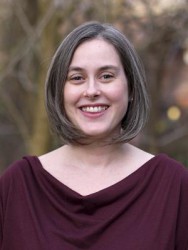
Jennifer Van Horn is an Assistant Professor of Art History and History at the University of Delaware. She teaches courses in American art, material culture, and museum studies. Her research interests range from George Washington’s dentures, to women’s embroidery, to wooden legs. Her current book project, Resisting the Art of Enslavement: Slavery and Portraiture in American Art, examines the connections between enslavement and portrait making and viewing in the 18th and 19th century plantation South. She has recently held senior fellowships at the National Portrait Gallery and Smithsonian American Art Museum and at CASVA (Center for Advanced Study in the Visual Arts) at the National Gallery of Art. She is the author of The Power of Objects in Eighteenth-Century British America (Chapel Hill, 2017) which was a finalist for the George Washington Prize, and received an honorable mention for the Louis Gottschalk Prize in Eighteenth-Century Studies. She has published articles in Art Bulletin, American Art, Early American Studies, and Winterthur Portfolio. Professor Van Horn earned her Ph.D. from the University of Virginia and her B.A. and M.A. from the University of Delaware. A graduate of the Winterthur Program in American Material Culture, she worked on the curatorial staff at George Washington’s Mount Vernon and taught at George Mason University and the Corcoran’s MA Program in the History of Decorative Arts, before returning to the University of Delaware. |
Maryam Vaziri-Pashkam
Maryam Vaziri-Pashkam, Ph.D., is an assistant professor in the Department of Psychological and Brain Sciences at the University of Delaware. She is a cognitive neuroscientist interested in the intersection of visual cognition and action.
Maryam has an M.D. from Tehran Medical University and a Ph.D. in cognitive psychology from Harvard University. After receiving her doctoral degree, she worked as a postdoctoral fellow at Harvard University and then as a research fellow at the National Institute of Mental Health.
Maryam’s research aims to advance our understanding of the computational and neural mechanisms that enable real-time interaction with objects and people. In the past, she has established the existence of robust representations for objects and actions in the human parietal cortex, a region that bridges the visual and motor areas of the brain. She has also demonstrated humans’ remarkable prediction ability during real-time social interactions.
She is now focusing on delineating the neural circuitry and mechanisms involved in extracting object shape for grasp, determining object affordances, and predicting others’ actions. To do this, she combines multiple methodologies, including body movement tracking, collection and analysis of large datasets of human behavior in naturalistic settings, neuroimaging, and computational methods such as machine learning and natural language processing. Her studies bridge traditional field boundaries and link cognitive, social, and motor neuroscience.
|
Jaipreet Virdi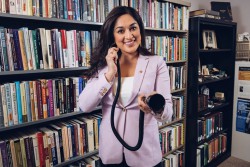
Dr. Jaipreet Virdi is a historian of medicine, technology, and disability. She received her M.A. (2008) and Ph.D. (2014) from the Institute for the History and Philosophy of Science and Technology at the University of Toronto. Her research concentrates on the way medicine and technology impacts the lived experiences of disabled people, and how disabled people in turn, have historically been central to technological innovations. Dr. Virdi’s first book, Hearing Happiness: Deafness Cures in History (University of Chicago Press, 2020) rethinks how therapeutic negotiation and the influence of pseudo-medicine shaped what it meant to be a “normal” deaf citizen in American history. Examining how deaf/deafened individuals attempted to amplify their hearing through various types of surgical, proprietary, and/or technological “deafness cures,” this book charts the dissemination of ideas about hearing loss from beyond medical elites to popular culture and the popular imagination. An amalgam of research and memoir, Hearing Happiness seeks to understand society’s obsession with the quest of a cure. The book received the 2021 Hughes Prize from the British Society for the History of Science and the American Association for the History of Medicine’s 2022 Welch Medal. In her undergraduate seminars “Disability in the American Experience,” and “History of Medicine,” and her graduate seminar “Disability Histories,” Dr. Virdi teaches students how to interpret material and visual sources to understand how cultural ideas of health, disability, and ability are embedded in objects. Her teaching is informed by her digital humanities project, Objects of Disability, which is currently being built. This project is an online resource database and narratives of historical artefacts used by, and/or crafted by, Canadians with disabilities, including adapted snowshoes for a one-legged person, iron hand prostheses, crafted purses for hearing devices, and more. Dr. Virdi’s is additionally working on three other research projects: a study of how deaf painter Dorothy Brett’s deafness influenced her artistic style; a material culture study of hearing aid tinkerers, and a co-authored book on the historical roots of interwar scientific research on disability through the lens of British scientist Phyllis M. Tookey Kerridge. Dr. Virdi serves as Contributing Editor of the Journal Pharmacy in History, Associate Editor of the Historical Journal of the Natural Sciences, Editor of Communiqué, the newsletter of the Canadian Society for the History and Philosophy of Science, and as Managing Editor of the Disability History Association’s blog, All of Us. |
Joelle Wickens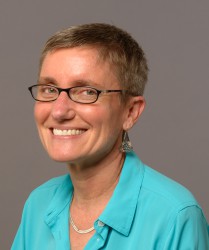
I am a daughter, sibling, wife, parent, educator, mentor, student, facilitator, organizer, preventive conservator, community conservator, engaged scholar…. Others identify me as disabled. I prefer phrases like, uses a wheelchair to navigate when outside of her home. At the University of Delaware, I am an assistant professor in the Department of Art Conservation. My current work in sustainable preventive conservation is dedicated to evolving the practice of preventive conservation to place social, economic, and environmental sustainability at its core. Equity and Inclusion in Conservation is the other theme on which I focus my energy, passion and commitment. My scholarship in this area is contributing to the field by developing an understanding of who holds the power and privilege needed to maintain the status quo, who and what has been excluded, and what it will take to include the excluded. The work in both of these areas has come together in the place where I am investing most of my time these days, the Community Conservation Initiative. I served at the Winterthur/University of Delaware Program in Art Conservation Interim Director from August 2023 – August 2024, and the Associate Director of this program from January 2018 – July 2023. Prior to coming to UD in 2019, I held the position of Preventive Conservator for Winterthur Museum, Garden, and Library, and Affiliate Assistant Professor for the University of Delaware. I joined the Winterthur faculty and staff in 2008 as an assistant textile conservator with an interest in preventive conservation. During my time at Winterthur my work evolved. I built on Winterthur’s and the University of Delaware’s already strong preventive conservation practice and teaching. As preventive conservator I directed a team of professionals who develop and implement preventive conservation policies and practices at the institution. This involved oversight of lighting, integrated pest management, storage, interior environmental conditions, housekeeping, storage and display materials testing, advising on facilities projects that impact collection spaces, care in collections training and more. As WUDPAC Associate Director, my responsibilities focused on curriculum oversight and support of student and faculty learning and teaching. I worked with all involved to build a program that trains conservators prepared to address the current needs in conservation as well as unknown changes to come. As Affiliated Assistant Professor I have been responsible for preventive conservation education development and implementation. This work can only be done in collaboration with those inside and outside the field of conservation. I am always on the lookout for partners in any field and/or any community who have an interest in cultural heritage. Please be in touch so we can explain our work to each other and see what comes of it. Website: https://sites.udel.edu/jwickens/ |
Lance Winn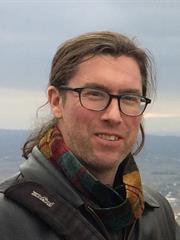
Winn’s personal work searches for the language embedded in processes of reproduction. From painting to kinetics and three-dimensional modeling, he investigates the nature of the image, particularly in relation to mediation and technology. His academic research is directed most specifically towards a history of modernity, best represented by Benjamin’s Arcades Project, and extending into material culture, architecture, and the affects of time on objects. Alongside this research Winn is studying alternate systems of visualization, particularly thermal imaging and other ways of seeing outside the visual spectrum, and is working with ways of capturing three-dimensional information. Through University grants he has studied three-dimensional scanning and other dimensional digital inputs as well as large-scale methods for outputting models from virtual space. Winn is a faculty member in the Center for Material Culture Studies where he has been a part of several colloquia, including the “Spaces of Shopping” which became the impetus for the book “Shopping: Material Culture Perspectives,” published by the University of Delaware press. He has written catalogue essays for “Reproduction” at Lemberg Gallery; for Brian Bishop’s solo show titled “Pause” at the University of Delaware ; and for a show he curated at the University of Delaware Galleries called “InWords,” that included an international group of artists who work with language as material. Most recently he co-wrote the essay “The Object of Nostalgia” with colleague Rene Marquez for a show they curated at Columbia College in Chicago, and wrote a catalogue essay for the work of Chris Hyndman’s exhibition “No Touching Zone,” at the University of Michigan. Winn’s personal work has been included in a range of recent books spanning themes from three-dimensional typography to Paul Virilio’s influence on contemporary artists. He has been nominated for the Louis Comfort Tiffany Award for painting, and his work was represented in an article on new forms of drawing that was published in Contemporary Magazine. Winn’s work has been shown nationally and internationally and in 2007 was part of a five-year survey at the Freedman Gallery. In collaboration with Simone Jones, Winn’s robotic projections have been shown most recently as part of The Montreal Biennale; at The Museum of Vancouver in conncetion with the 21st International Symposium on Electronic Art; Nuit Blanche in Toronto; the Ronald Feldman gallery in New York, and the Icebox in Philadelphia. Their work was presented at the Electra Festival, in “Stop,” a two-part show of international artists in Montreal, at the Banff Center for the Arts in Canada, “Media City 11 International Festival of Experimental Film and Video Art” in Windsor, Ontario, and in “Machine Life” at the Davies Foundation and Samuel J. Zacks Galleries in York, Ontario. |
Julian Yates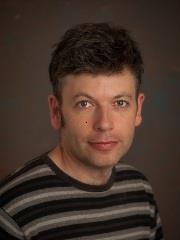
Julian Yates is H. Fletcher Professor of English and Material Culture Studies at University of Delaware. He is the author of numerous essays on Medieval and Renaissance literature and culture, questions of ecology, the posthuman, and literary theory. His books include: Error, Misuse, Failure: Object Lessons from the English Renaissance (University of Minnesota Press, 2003), which was a finalist for the Modern Language Association’s Best First Book Prize; What’s the Worst Thing You Can Do To Shakespeare? (Palgrave Macmillan, 2013), co-authored with Richard Burt; Object-Oriented Environs in Early Modern England (Punctum Books, 2016), co-edited with Jeffrey Jerome Cohen; and Of Sheep, Oranges, and Yeast: A Multispecies Impression (University of Minnesota Press, 2017), winner of the Michelle Kendrick Memorial Book Prize from SLSA (Society for Literature, Science, and the Arts). His research has been supported by grants from the Andrew Mellon Foundation, the National Endowment for the Humanities, the Folger Shakespeare Library, the Huntington Library, and the American Philosophical Society. He is currently at work on Noah’s Arkive: Towards an Ecology of Refuge, a study of the legacies of Noah’s Ark in contemporary accounts of global warming with Jeffrey J. Cohen; and a book on Shakespeare’s dramaturgy and contemporary discourses of refuge with the working title Cosmopolitical Shakespeares. |



